August 04, 2016
April 27, 2023
Electric Roadtrip liveblog - Day 1 - Tacoma to Stanton County Park (Canyonville, OR)
Day 1 of my electric roadtrip, I drove from Tacoma, WA to Stanton Park, Canyonville, OR (~350 miles). I like to camp when possible on EV road trips; tent time is good, and I can usually charge overnight at any RV spots.
Packing:
Packing for an electric road trip is more or less the same as for a regular (gas car) roadtrip; there’s just a couple of things that are different, enabled by the big EV battery:
- I carry a power pack (EcoFlow Delta Mini) and a powered cooler; the main EV battery keeps the Delta topped off during the day, the EcoFlow keeps the cooler cool through the night
- I also bring electric camp kitchen devices - an electric Moka pot, an electric kettle. In the mornings, I can run them off of the EcoFlow and not have to get out fuel or my little alcohol stove
Planning and routing:
Planning and routing an EV Roadtrip planning currently requires a hodgepodge of mapping apps and maps; basically, you need to find a destination; a route with chargers spaced well; and a plan for which chargers to use and how long to charge at each one.
Some considerations:
- Electric cars generally charge _much_ faster when their batteries are low than when they’re closer to full; for the Chevy Bolt, it charges at ~50 kW in the 0% - 50% range; and tapers off from there to ‘pretty slow’ in the 80% range
- You don’t need to or want to “fill up” at each charger; you instead want to charge only enough to get to the next charger in your plan, plus some buffer
- Hills and temperature affect range - budget for them!
For the first day, I looked for a campground near Grants Pass, OR; I had a noon meeting, so I couldn’t start that early. Grants Pass is ~380 miles, a good day’s drive.
Once I found an open campground (Stanton Park, in Canyonville, OR), I used ‘A Better Router Planner’ (better than nothing, anyway) to make a route from Tacoma, WA to the campground:
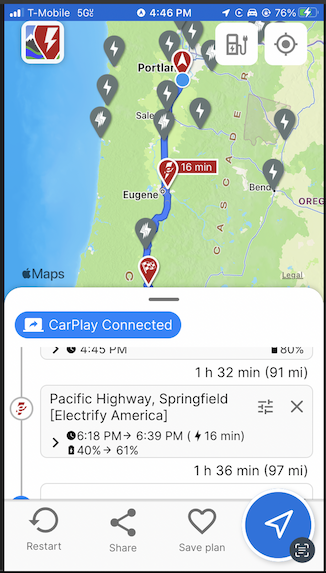
A Better Route Planner created a plan that had me charge for ~30 minutes in Portland, OR and ~30 minutes in Springfield, OR.
Once A Better Route Planner comes up with a plan, I check the first charger on PlugShare, an app that tracks recent checkins to a charger, to make sure that it's working. I then use Google Maps to route to the charger. At each charger, I repeat for the next, while waiting for the car to charge.
On-the-fly Rerouting:
Today was a beautiful, mid-70s, low-wind day; the Bolt was running more efficiently than it has all winter, so I was able to stretch the first leg from Portland, OR to Wilsonville, OR. Wilsonville, OR has one of my favorite chargers - it’s right next to a library and a city park, a great spot to fill up on water and go for a solid walk. And It’s on the Shell Recharge network, which works reliably in my experience.
To re-route, I checked the Wilsonville charger on PlugShare and had Google Maps route there instead:
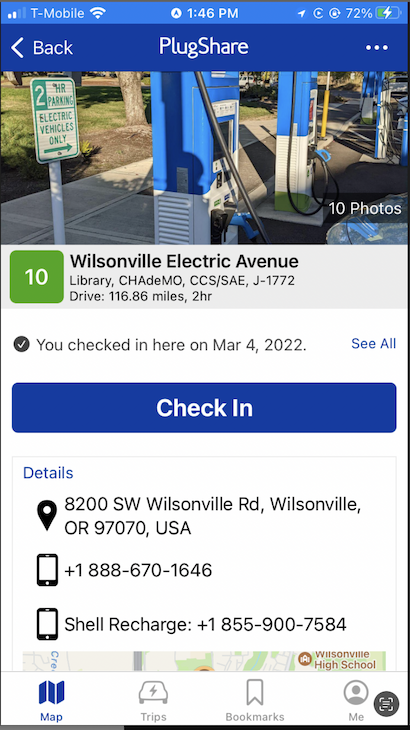
At Wilsonville, I chose to wait longer than the plan called for, charging for ~50 minutes up to over 80% while I walked around the park and had a snack.
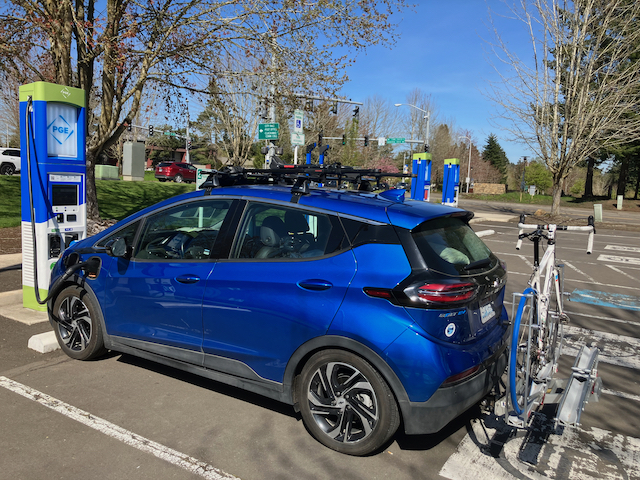
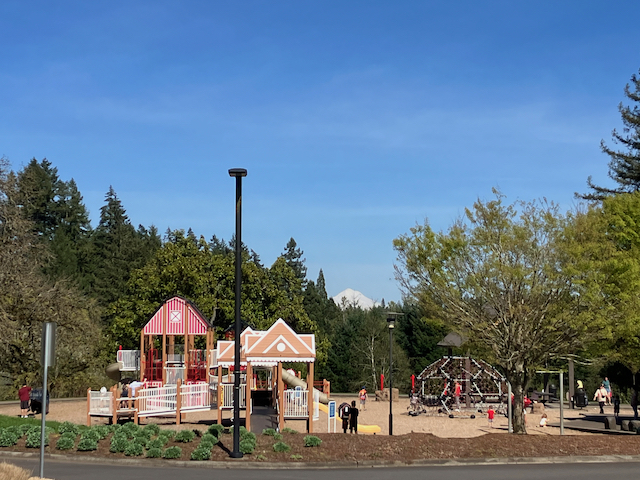
I then had A Better Route Planner remake the plan - it doesn’t seem to cope with being ‘off route’ and it doesn’t know how to pull live data (charge %) from the Bolt, so I had to put that in. It came up with a new plan, a quick stop in Springfield, OR.
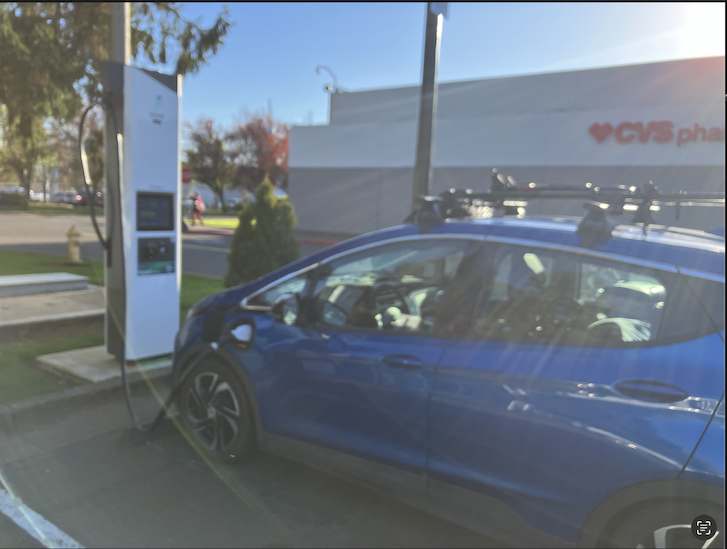
A 15 minute stop in Springfield, in a Target parking lot (not every fast charger can be next to a park or a bakery). This charger was an Electrify America station, worked on the first try.
It’s possible this stop wouldn’t have been required if I had spent a bit more time in Wilsonville and had been willing to let the battery run lower, but I was playing it conservatively while I figured out my route.
Then I drove ~100 miles down to the campground in Canyonville, OR and set up camp. RV sites (where I can charge overnight) were available.
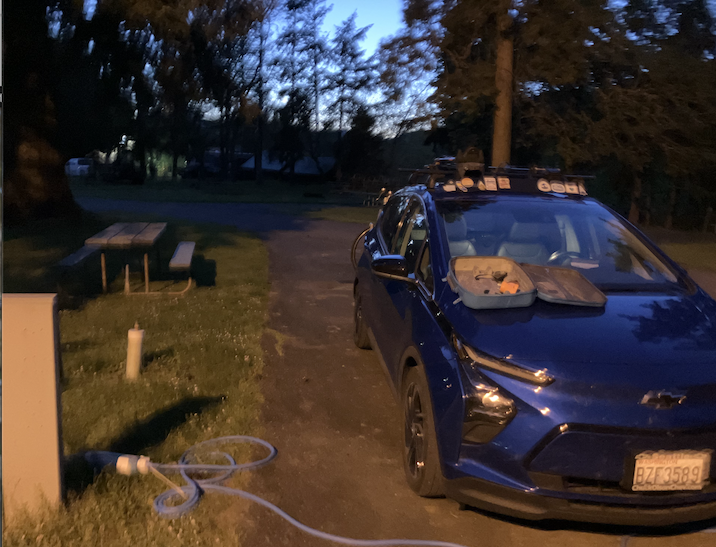
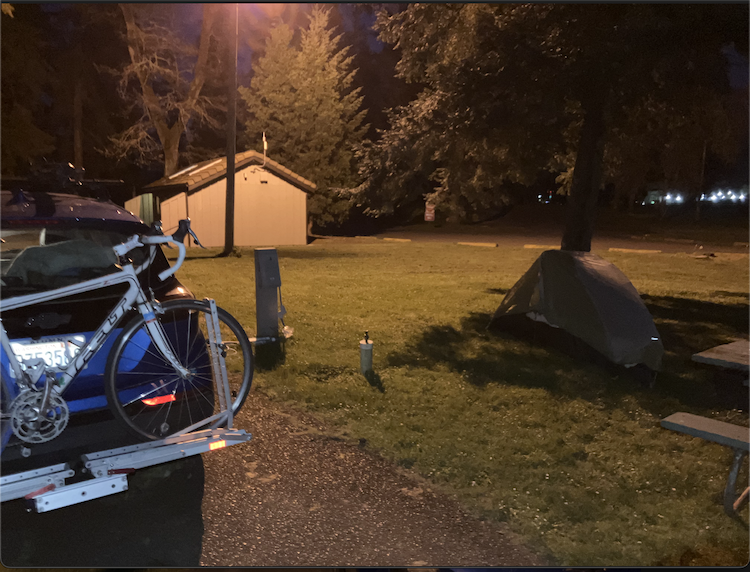
At the campground, I was able to plug in to an RV post; the post has a 30 A plug, unfortunately the standard for ’30 A’ plugs is 120v/30A, and the Bolt limits itself to 12 A on 120v (1.4 kW). A number of EVs have this limitation, though not Teslas.
This campground is a good-enough option, though it’s pretty close to I-5.
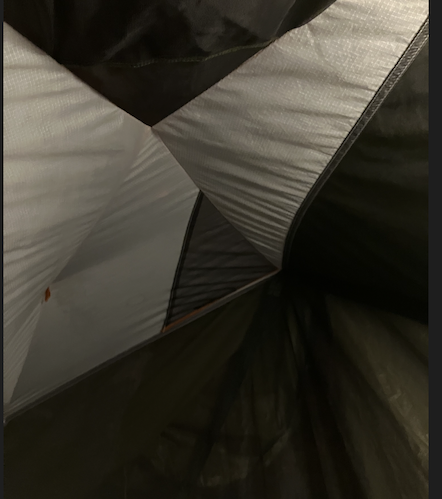
Good night! On to Grants Pass and California tomorrow
Underway on Electric Power, an EV Roadtrip liveblog
I'm going on an electric car road trip - Seattle to Bodega Bay, CA to help my ex- in the field at Bodega Marine Reserve; then Bodega Bay, CA to Dolores, CO to train for and ride the Iron Horse Bicycle Classic and to go to the Telluride Bluegrass Festival with family; then back to Seattle.
I'm driving a Chevy Bolt; the Bolt uses the "CCS" network of public chargers, like most non-Tesla electric cars. CCS and public charging have a mixed-reputation; electric roadtripping is still a "new" phenomena, especially with non-Teslas. My co-worker Liz Shelly prompted me to share my experiences - how I plan the trip, how / where I charge and camp, and what worked and what didn't!
I'll be liveblogging the trip; day 1, Tacoma, WA on to Oregon!
February 07, 2023
Johannes Ackva (Founders Pledge Climate Fund)/Dave Roberts (Volts) transcript
Johannes Ackva (Founders Pledge - Climate Fund) and David Roberts (Volts podcast, formerly Vox) got together last summer to talk about climate philanthropy, the Founders Pledge Climate Fund's approach, and the role of small-scale smart giving in the climate space. I found the conversation notable and decided to transcribe it.
Few highlights from the conversation and the approach:
- Climate damage is highly non-linear -- going from 1.5 C to 2 C is less bad than 3.5 C to 4 C
- Most climate folks (including me) prioritize reducing emissions rather than 'minimizing damage'; however since damage is non-linear, the two approaches don't always track and it's important to focus on the actual goal
- Low-risk, well-understood solutions are currently well-funded; higher risk solutions are often underfunded for structural reasons
- Those underfunded higher-risk solutions likely are ones most required in higher-'damage' worlds
- A particularly valuable (high leverage) role for philanthropy is to take risks; hedge against the worst outcomes; and accept failure
https://www.volts.wtf/p/volts-podcast-johannes-ackva-on-effective
Transcribed with OpenAI Whisper followed by a hand-editing pass.
Continue reading "Johannes Ackva (Founders Pledge Climate Fund)/Dave Roberts (Volts) transcript"
December 31, 2022
2022
2022 Grab Bag:
- Finished my Masters degree (CSE @ UW)!; on top of that, took an Advanced Computer Architecture class & an Electric Grid regulation class from a WA UTC commissioner
-
Two ten-year anniversaries - ten years since my 4K bike ride from Baltimore to Portland (Chelsea from my year wrote the best retrospective); and ten years since I started working at Google

- Failed to hold a relationship together
-
Tens of thousands of miles of EV road-tripping!
Seattle, WA to Bodega Bay to North Lake Tahoe to Moab to Pullman, WA;
Seattle, WA to Dolores, CO and back;
Seattle, WA to Taos, NM and back;



-
A week sampling clover at Bodega Marine Lab, overlooking the Pacific Ocean

- Spent a month in a ~new place and state (Taos, NM)
- Donated a quarter of my income to climate and Effective Altruism organizations 😬 (details)
- Read 26 books; top three:
- Warmth, Daniel Sherrell - Talking about "The Problem" (Climate Change) in letters to a future child.
The author, Daniel Sherrell, is from New Jersey, not far from where and when I grew up; he works on climate advocacy in New York State. I found his perspective very relatable - he understands and draws on the technical, but writes the visceral. His evocation of love as fury is pretty powerful and stood out to me among climate writing.
- On Repentance and Repair, Danya Ruttenberg - Thinking about repentance, repair, and reconcilliation through a framework from Maimonides
The framework offered here is fairly different than the one I grew up with - it starts with objective statements of what happened; change to ensure the harm is not repeated; restitution and consequences; apology (delayed all the way to step 4!); and making different choices. As elaborated, it sounds like it would better address harm I have caused; it also seems like it'd be pretty demanding. I particularly appreciated an examination of something I do (apologize) but had never given great thought to.
- Ducks, Kate Beaton
- Warmth, Daniel Sherrell - Talking about "The Problem" (Climate Change) in letters to a future child.
-
First concert since the pandemic started (Gregory Alan Isakov at the Gorge)
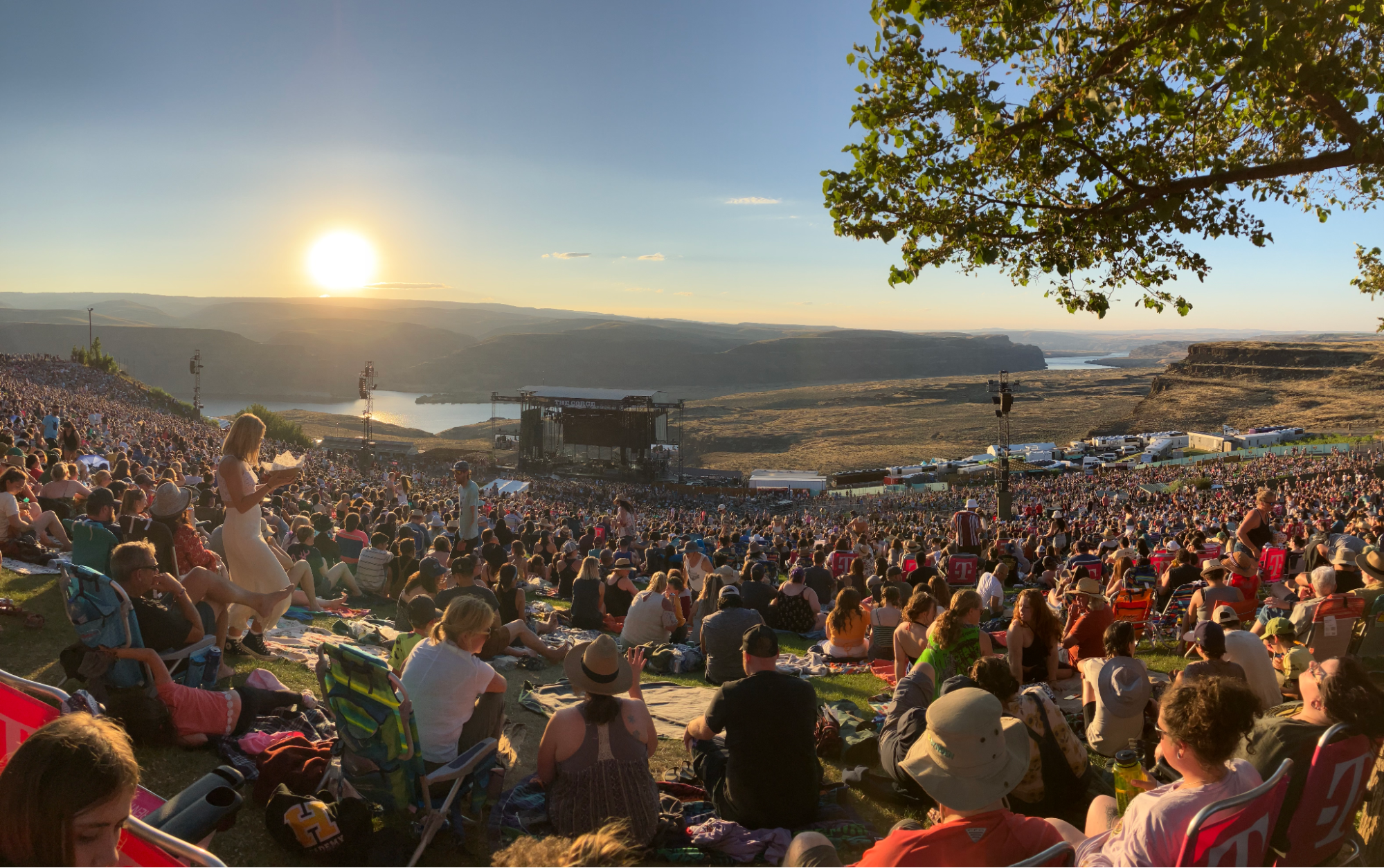
-
Made jam and Ice Cream for the first time!



Made Fig and Pear, Peach, and Onion jams; Onion was the most successful -
Biked Mt. Constitution, part of the Sea to Sky Highway (BC Hwy 99), and Harvest Century
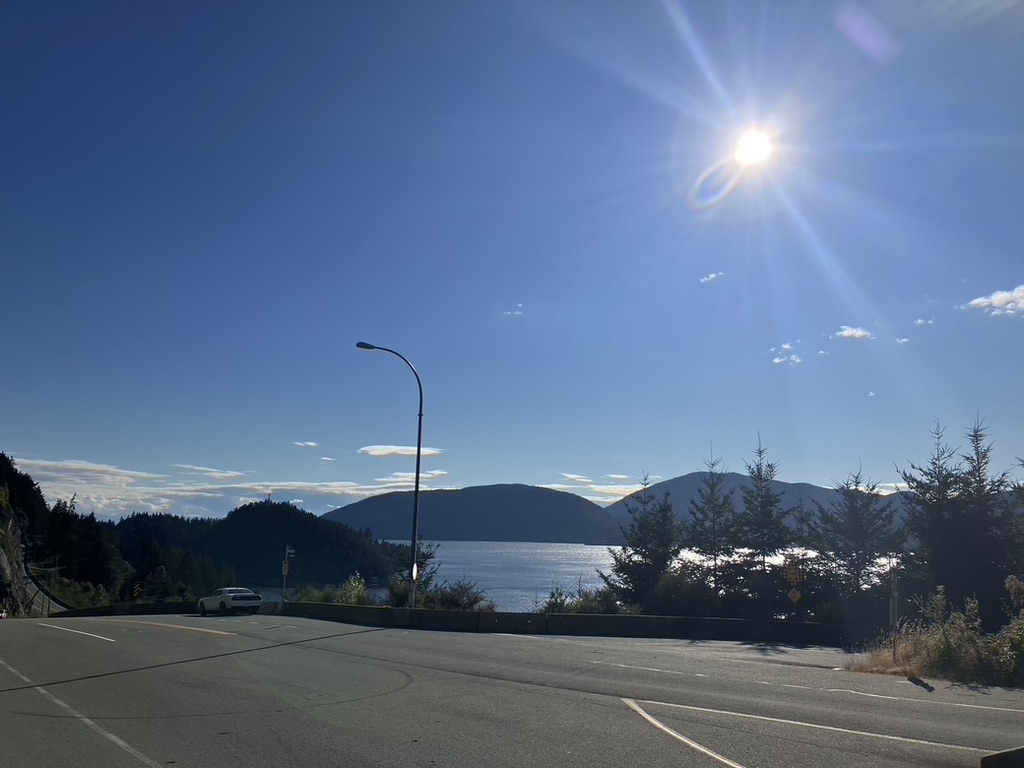
-
Grew tomatoes, a Sequoia, and potatoes (by mistake!)


- News story from the year that's stayed with me - Climate Change from A to Z, Elizabeth Kolbert, New Yorker Nov 2022
It's been an eventful, rich year. There's a lot I wish I'd done, a lot I wish I'd done better; but I tried new and hard things and learned from both the successes and failures.
See you in 2023!
2022 December 31, 2022
How much does it cost to drive an electric car? March 21, 2022
STS135 - Ten Years After July 08, 2021
gVNIC May 08, 2021
Organizations I've supported in 2018 and 2019 H1 July 02, 2019
Recurse Center - First steps w/ Queues July 16, 2018
Organizations I'm supporting in 2018 March 21, 2018
Organizations I've supported in 2017 December 28, 2017
Detect. Transmit. March 21, 2017
Organizations I'm supporting this year February 12, 2017
4K for Cancer 2015 - Seattle, WA August 14, 2015
4K for Cancer Portland 2014 - Portland, OR August 16, 2014
A couple of days with 4K Portland 2014 July 31, 2014
4K for Cancer 2014 Sendoff & Day 1 June 08, 2014
Trust Fall June 06, 2014
4K for Cancer Seattle 2013 - Seattle, WA August 26, 2013
4K for Cancer Portland 2013 - Cannon Beach August 25, 2013
Baltimore to Portland September 29, 2012
Blink and life flies by. August 03, 2012
Day 68 -- Tillamook to August 02, 2012
Day 67 -- Corvallis to August 01, 2012
Halfway to Corvallis. After that, July 31, 2012
Before riding to Corvallis, Team July 31, 2012
Day 66 -- Eugene to July 31, 2012
Day 64 -- Rest day July 29, 2012
Crossing Country and Catching Up, part 1 July 18, 2012
In Denver, CO. Veiled mountain July 03, 2012
Something is hidden in the July 03, 2012
@4KPortland 200mi in 2 days, July 01, 2012
Welcome to Colorful Colorado! July 01, 2012
The country from Franklin, NE June 28, 2012
#4kportland Cheers from Arapahoe, NE!! June 28, 2012
#4kportland Day 33 -- To June 28, 2012
#4kportland Iowa is not flat!! June 23, 2012
#4kportland Day 28 -- Atlantic, June 23, 2012
#4kportland Day 25 -- Wheatland June 20, 2012
#4kportland Day 24 -- Iowa June 19, 2012
#4kportland Day 23 -- 120mile+ June 18, 2012
@4kportland Day 21 -- Chicago June 16, 2012
@4kportland winning June 09, 2012
#4kportland -- Cincinnati to Lexington, June 08, 2012
Intro & Twelve Days June 07, 2012
First week of #4kportland!! (@4KPortland) June 03, 2012
#4kportland Day 8 -- Canton, June 03, 2012
#4kportland at the host in June 02, 2012
#4kportland Day 7 -- Youngstown June 02, 2012
Reached host in Youngstown! _So_ June 01, 2012
#4kportland Day 6 -- Pittsburgh, June 01, 2012
#4kportland Day 4 -- Ligionier, May 30, 2012
4K day 2: Waking up May 28, 2012
@4KPortland group 4 is in May 27, 2012
My last night in Baltimore. May 27, 2012
An alumni's thoughts on 4K; May 18, 2012
IOCCC Korn 1987 August 04, 2007
April 2023
February 2023
December 2022
March 2022
July 2021
May 2021
February 2020
July 2019
July 2018
March 2018
December 2017
March 2017
February 2017
August 2016
August 2015
August 2014
July 2014
June 2014
August 2013
September 2012
August 2012
July 2012
June 2012
May 2012
August 2007